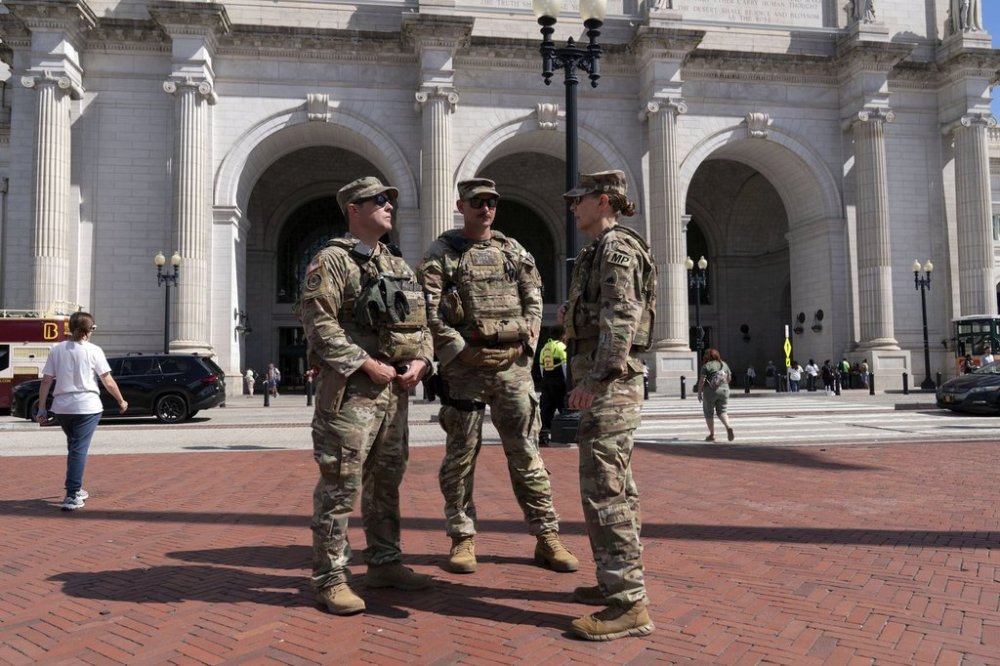Top Stories
National Guard Deployment in D.C. Sparks Outrage and Lawsuits

UPDATE: A controversial deployment of the National Guard in Washington, D.C., continues to raise alarm bells as officials and experts warn of a disturbing trend towards militarized policing. Tourists and locals are encountering soldiers at iconic locations like Union Station, where dozens of troops have been stationed since August 11, 2025, amidst President Donald Trump‘s declaration of a crime-related emergency.
As the emergency is set to expire on September 10, 2025, Congress has signaled it will not extend it, yet Trump has suggested keeping the troops in place longer, further inflaming tensions within the community. Local residents have expressed their anger, noting that the troops are primarily positioned in tourist-heavy areas and public transit hubs, often appearing disengaged as they scroll through their phones.
The deployment is costing American taxpayers at least $1 million each day, prompting protests across the city. Thousands of “Free D.C.” signs have emerged in windows, symbolizing local discontent against what many perceive as an infringement on the autonomy of the District of Columbia.
In a significant legal move, the District of Columbia, led by Attorney General Brian Schwalb, has filed a lawsuit against the Trump administration, asserting that this military presence constitutes an illegal use of the military for domestic law enforcement. Schwalb stated,
“No American jurisdiction should be involuntarily subjected to military occupation.”
Legal experts have voiced their concerns regarding the implications of this deployment. Aziz Huq, a law professor at the University of Chicago, highlighted the historical precedent against military involvement in policing, specifically referencing the Posse Comitatus Act. This law restricts federal military forces from engaging in law enforcement unless permitted by law.
The ramifications of Trump’s actions extend beyond D.C. as he has threatened to deploy troops to other Democratic strongholds, including Chicago and Baltimore. His attempts to enlist local governors, such as Illinois Governor JB Pritzker, have met with resistance. Pritzker condemned Trump’s remarks as “unhinged,” reiterating that local leaders oppose such military involvement.
If Trump proceeds to send troops to other cities, experts fear it could set a dangerous precedent for executive overreach and the normalization of military presence in civilian spaces. This situation echoes historical instances where federal troops were deployed against the wishes of state governors, raising questions about the legality and morality of such actions.
In the heart of D.C., veterans have gathered to protest this deployment, expressing fear over what they deem “creeping authoritarianism.” Lelaina Brandt, a veteran, stated, “We fear that this is just sort of boiling the frog slowly… getting people used to the idea of having armed military on the streets of our cities.”
Political science experts warn that while the troops’ activities may seem benign—some spotted picking up garbage—their presence still constitutes an act of intimidation. Matthew Lebo from Western University remarked, “It’s a frightening step,” asserting that Americans should not have to accept militarization as a trade-off for security.
As the situation remains fluid and evolving, residents and experts alike are closely monitoring the developments surrounding the National Guard’s presence in Washington, D.C. The outcome of the lawsuit and the potential for further troop deployments could have lasting implications for civil liberties and the relationship between federal and local authorities.
Stay tuned for updates as this story develops. The urgency of the situation underscores the need for public awareness and engagement in the ongoing discussion about the future of policing and military involvement in American cities.
-

 Politics1 month ago
Politics1 month agoSecwepemc First Nation Seeks Aboriginal Title Over Kamloops Area
-

 World5 months ago
World5 months agoScientists Unearth Ancient Antarctic Ice to Unlock Climate Secrets
-

 Entertainment5 months ago
Entertainment5 months agoTrump and McCormick to Announce $70 Billion Energy Investments
-

 Science5 months ago
Science5 months agoFour Astronauts Return to Earth After International Space Station Mission
-

 Lifestyle5 months ago
Lifestyle5 months agoTransLink Launches Food Truck Program to Boost Revenue in Vancouver
-

 Technology3 months ago
Technology3 months agoApple Notes Enhances Functionality with Markdown Support in macOS 26
-

 Lifestyle3 months ago
Lifestyle3 months agoManitoba’s Burger Champion Shines Again Amid Dining Innovations
-

 Top Stories2 months ago
Top Stories2 months agoUrgent Update: Fatal Crash on Highway 99 Claims Life of Pitt Meadows Man
-

 Top Stories1 week ago
Top Stories1 week agoHomemade Houseboat ‘Neverlanding’ Captivates Lake Huron Voyagers
-

 Politics4 months ago
Politics4 months agoUkrainian Tennis Star Elina Svitolina Faces Death Threats Online
-

 Sports5 months ago
Sports5 months agoSearch Underway for Missing Hunter Amid Hokkaido Bear Emergency
-

 Politics5 months ago
Politics5 months agoCarney Engages First Nations Leaders at Development Law Summit





















